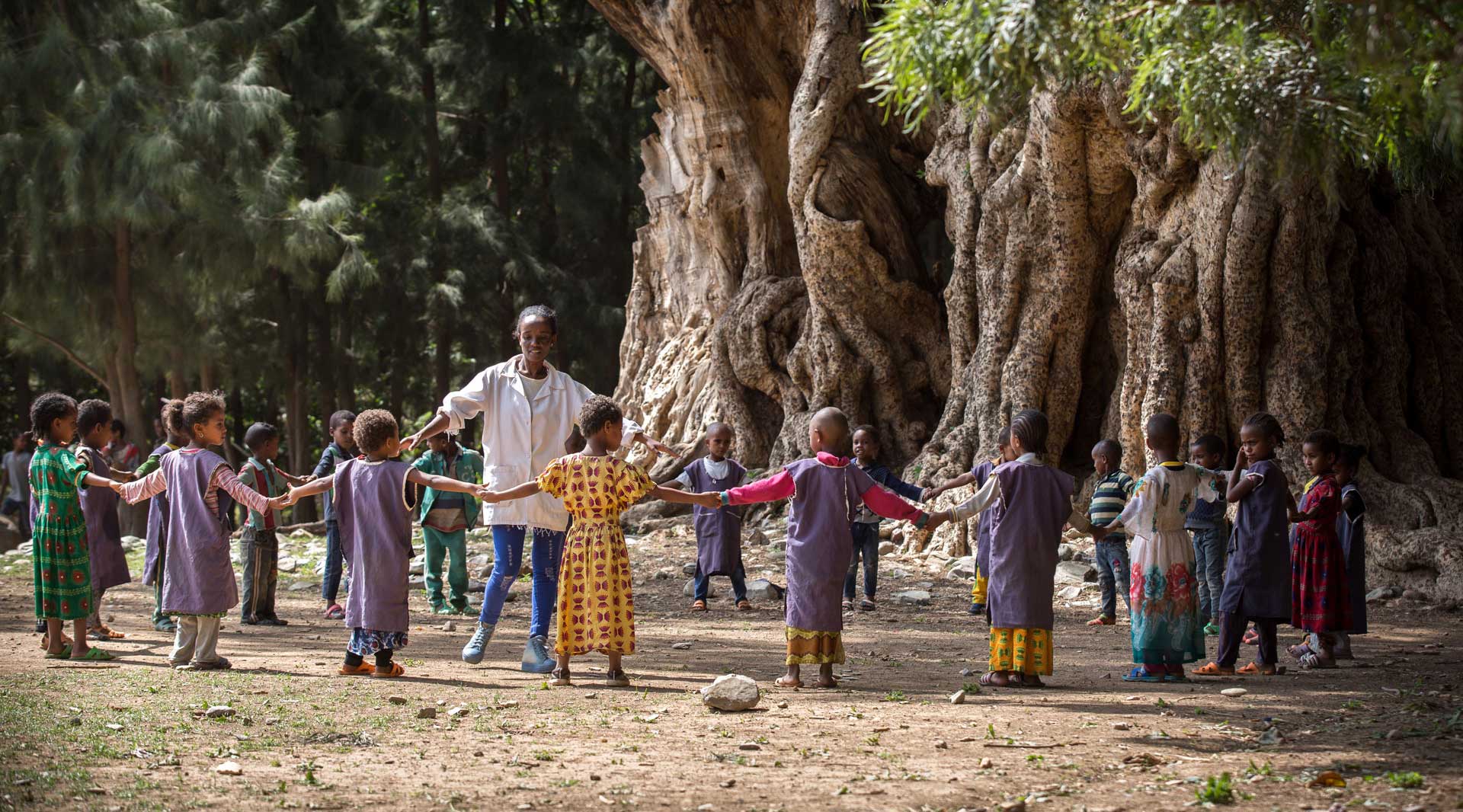In Addis Ababa, learning through outdoor play
A major early childhood initiative supports climate action
A major early childhood initiative supports climate action
 Photo: Courtesy of UNICEF
Photo: Courtesy of UNICEF
In Ethiopia’s capital, Addis Ababa, the imperative to invest in the early years is clear: our population is expected to exceed 6.5 million by 2027 (World Population Review, 2021) – and 20% of that population will be children under the age of 6. We have planned a bold, holistic approach to improving early childhood development in the city in preparation for this wave of growth.
When we started, climate change was not uppermost in our minds. But it soon became clear that the two issues were linked, and we could achieve a double win by preparing our children for the future while achieving environmental benefits for the entire city.
The programme we designed is called Children: The Future Hope of Addis Ababa Early Childhood Development Initiative.1 It is a commitment to provide universal access to comprehensive early years services to all 1.3 million children under 6 years old who will live in the city by 2027, with intensified support for vulnerable children in 330,000 low-income households. Evidence consistently shows that investing in early childhood development is one of the most effective methods to break cycles of poverty in vulnerable societies, bringing long-lasting dividends (Heckman, 2008; World Bank, 2018).
The initiative includes parent coaching, health and social support services for vulnerable families, expanding daycare centres and pre-primary education, and establishing a world-class centre of excellence to support the development of the early childhood workforce.
‘It soon became clear that the two issues were linked, and we could achieve a double win by preparing our children for the future while achieving environmental benefits for the entire city.’
A major part of the initiative focuses on increasing opportunities to learn through play, which is important for children’s development of motor, cognitive and social and emotional skills (UNICEF, 2018). We are investing in new public spaces that integrate nature to create healthy environments that will contribute to children’s mental and social development. For example, the city’s Green Development and Environmental Protection Commission will select ten sites for play areas, aiming to reach 25,000 children every quarter. Every new public housing complex will also include the construction of a play area.
We are also revitalising existing urban spaces, transforming them into green areas or squares that are safe to play and spend time in. This includes 30 “open roads” on Sundays where children can play without concerns about traffic. We plan to plant trees and seedlings along roadsides, to offer shade and contact with nature for toddlers walking with their caregivers.
As we designed the programme, we realised that these interventions would also address a whole suite of issues that we had not previously thought of as directly linked to early childhood development, including environmental impact and climate change.
‘We plan to plant trees and seedlings along roadsides, to offer shade and contact with nature for toddlers walking with their caregivers.’
The initiative’s green spaces for play were not planned for environmental reasons, but they have the potential to make a real difference to climate change – especially as we aim to scale-up the Future Hope of Addis programme to the rest of the country and inspire similar programmes across the continent.
This element of the initiative runs complementary to one of the four pillars of the Ethiopian government’s Climate-Resilient Green Economy strategy (Climate Action Tracker, 2021), namely the adoption of energy-efficient technologies in transport, industry and the built environment, along with reducing agricultural emissions, protecting and expanding forests, and expanding renewable electricity generation.
We continue to develop our own approach and to learn from implementation. We hope that others can benefit from our experience by more intentionally including climate change in children-focused programmes and investment in the early phases.
Research increasingly points to the potential for education to benefit climate action, by improving both understanding of the challenge and the skills to envision new solutions (The Key, 2020). In particular, the Brookings Institution makes the case that educating girls can have a big impact on climate change by reducing the population growth rate (Kharas, 2016).
Our goals are ambitious. We aim to transform Addis Ababa by improving its environment and services to create friendlier, greener and more open public spaces for children, their parents and caregivers. By investing in the infrastructure of early childhood, we aim to ensure that our young population will grow up healthier, stronger and more capable of playing a positive role in the subsequent improvement of their city, their country and the planet.
1Children: The Future Hope of Addis Ababa Early Childhood Development Initiative is supported by the Bernard van Leer Foundation and Big Win Philanthropy. Information about this initiative is available at: https://www.bigwin.org/nm_pent_bigwp/wp-content/uploads/2020/07/Ethiopia_12pp_A4_WEB.pdf
All references can be found in the PDF version of the article.
See how we use your personal data by reading our privacy statement.
This information is for research purposes and will not be added to our mailing list or used to send you unsolicited mail unless you opt-in.
See how we use your personal data by reading our privacy statement.